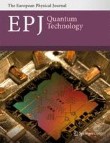Guest Editors:
Yury Kurochkin - 1. Russian Quantum Center, Moscow, Russia, 2. QRate, Skolkovo, Russia 3. NTI Center for Quantum Communications, National University of Science and Technology MISiS, Moscow, Russia
Roman Shakhovoy - 1. QRate, Skolkovo, Russia, 2. NTI Center for Quantum Communications, National University of Science and Technology MISiS, Moscow, Russia
Kai Bongs - University of Birmingham, United Kingdom
Random numbers constitute an important part of science, finance, engineering, and contemporary cryptographic systems. Large number of everyday applications, such as mobile communications, non-cash payments, emailing, internet-banking, cryptocurrency, blockchain networks, use certain sources of randomness. Overwhelmingly, these sources represent computer algorithms for generating pseudorandom numbers, which are potentially vulnerable for various attacks. Emerging quantum computers could make pseudo-randomness-based cryptographic systems defenseless; therefore, much attention is paid today to quantum key distribution or “quantum cryptography” systems, where quantum random number generators (QRNGs) take a special place.
The main goal of the topical collection “Quantum Random Number Generation” is to reveal the need for QRNGs in various areas of science and business and to facilitate the dialogue between the academia and commercial information technology companies. This special collection addresses the survey of various quantum entropy sources. Special attention will be paid to formal definition of quantum and classical randomness and to the problem of quantum entropy extraction. An additional objective of this collection is an overview of manufacturers and their solutions on the market of QRNGs.
Deadline: 30 June 2023
Please refer to the journal’s Submission Guidelines for the preparation of the manuscript.
Important: Upon submission please select the appropriate article type (i.e. Research, Review, Comment or Brief Report) and the topical collection from the "Collection" drop-down menu under the "Details" tab.
The guest editors will oversee the editorial and peer-review process. Accepted articles are published open access and automatically assigned to a volume and issue after the proofs are corrected. They will be accessible through the regular volume and issue, as well as collected online under their specific special collection tab.
- - - - - - - - - --
